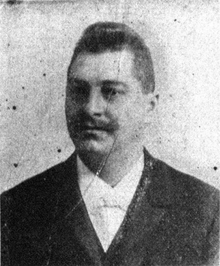August Forstner
August Forstner (born July 29, 1876 in Vienna , † February 14, 1941 in Wolfpassing , Lower Austria ) was an Austrian politician .
Life
Forstner's father was the owner of a Fiaker company , in which the young August had to work at a young age. To support his family, he broke the age of 16 the public school from, and also began working as a cab. Early on he surrounded himself with social democratic groups and was thus active in the workers' education association in the Viennese district of Mariahilf .
The attempt to take over an already existing union and reactivate it under his leadership failed, so that in 1898 he founded the association of coachmen and unskilled workers , which developed into the association of trade, transport and traffic workers . Forstner remained its chairman until 1934. Although it was still a young labor movement, in August 1904 it was able to achieve better working conditions for the Viennese heavy-duty drivers, including a 14-day notice period and a wage increase. Since independent Fiaker companies saw their existence threatened, Forstner fell out with his father, who subsequently disinherited his son. The journal Die Peitsche was launched in 1899, with August Forstner as its editor. In 1904 it was renamed Zeitrad .
In addition to his union activities, Forstner found employment with the general workers' health and benefit fund in 1902. In 1905 he was subsequently appointed secretary of the assistant health insurance fund of the cooperative of large and small wagon owners.
In 1907 Forstner was elected to the Reichsrat as a member of the Social Democratic Party of Austria (SPÖ) , to which he belonged until 1918. Many of his colleagues gave him the affectionate nickname “the coachman in parliament” . In the same year he moved to the National Council , where he again held a mandate until 1934. During his time in the National Council, Forstner campaigned for the introduction of nationwide health insurance , which can be seen as his most sustainable political legacy.
Parallel to his work at the federal level, Forstner sat from 1918 to 1919 as a member of the Lower Austrian state parliament , and subsequently from 1918 to 1923 in the Vienna municipal council .
August Forstner died in 1941 at the age of 64. His honorary grave is at Hietzinger Friedhof (group 17, row 3, number 142).
In 1949, in honor of him, a residential complex designed by the architect Gottlieb Michal in the 15th district of Vienna, Rudolfsheim-Fünfhaus , was named Forstnerhof .
Web links
- August Forstner on the website of the Austrian Parliament
| personal data | |
|---|---|
| SURNAME | Forstner, August |
| BRIEF DESCRIPTION | Austrian politician (SPÖ), member of the state parliament, member of the National Council |
| DATE OF BIRTH | July 29, 1876 |
| PLACE OF BIRTH | Vienna |
| DATE OF DEATH | February 14, 1941 |
| Place of death | Wolfpassing , Lower Austria |
